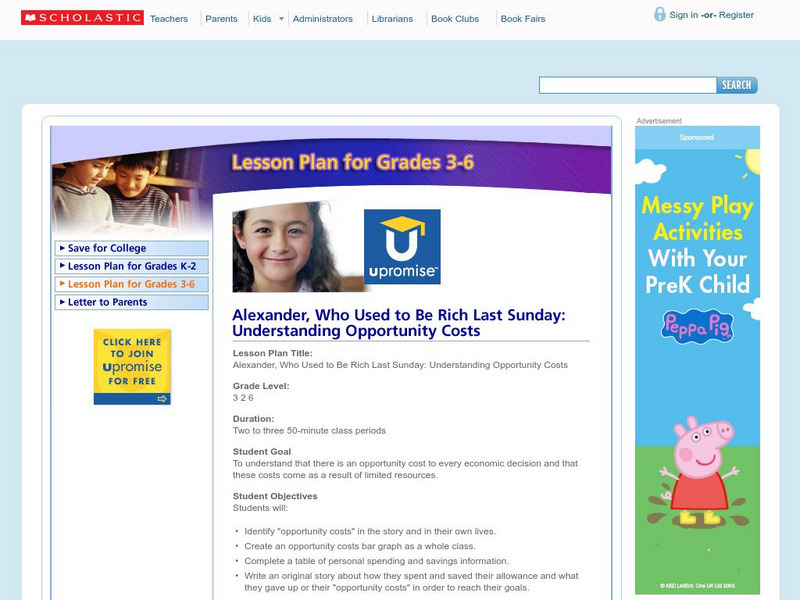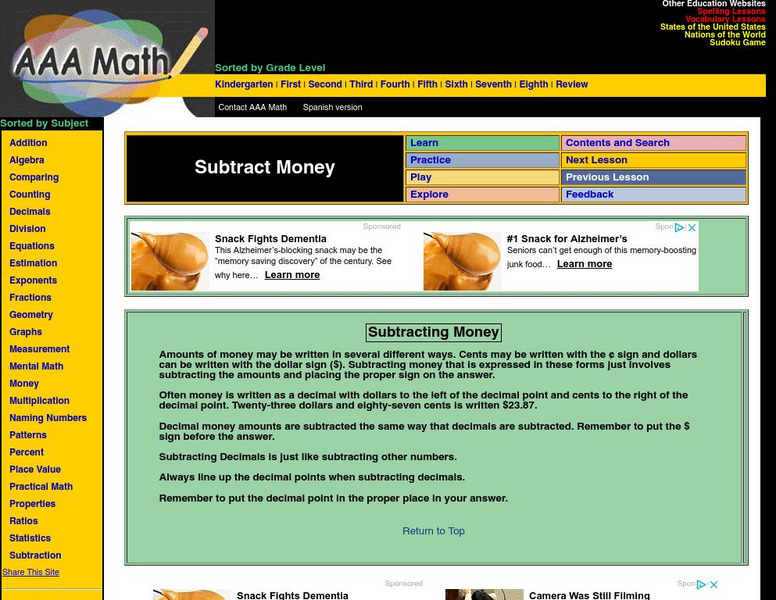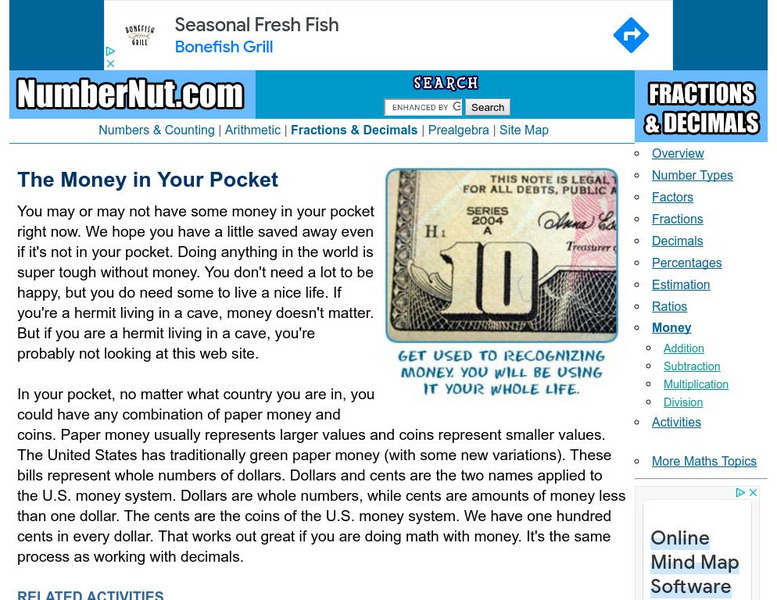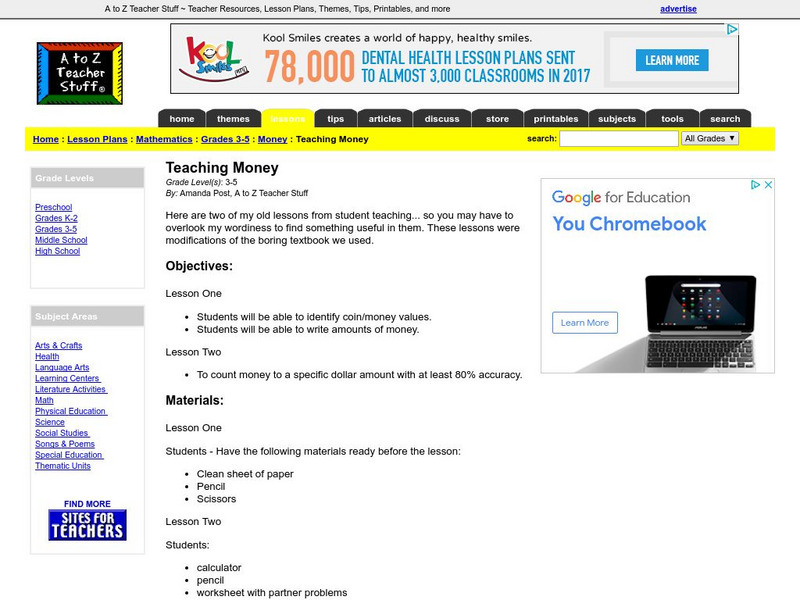Hi, what do you want to do?
Scholastic
Scholastic Lesson Plan: Alexander, Who Used to Be Rich..
This multipart lesson plan the cost of opportunities when you have limited resources. It uses the hilarious children's book, "Alexander, Who Used to Be Rich Last Sunday" by Judith Viorst to drive the lesson home.
Other
International Monetary Fund: All About Money [Pdf]
A valuable resource for educators who are teaching their young scholars about money. A series of lesson plans cover everything from the different forms of currency over time, to trade and economic growth and exchange. Activities and...
Smithsonian Institution
Smithsonian Learning Lab: What Shape Is Money? Money Doesn't Have to Be Round or Rectangular
Pigs, rice, nuts, teeth, eggs, feathers - these are all types of currency! This instructional activity discusses different types of objects that can be used as currency and students will decide what qualities make an effective currency....
Council for Economic Education
Econ Ed Link: Buy a Bond, James: A Lesson on Us Savings Bonds
This site is extremely informative for teaching children the value of saving money. "You will write a persuasive letter telling why people use savings bonds as a way to save their money."
Federal Reserve Bank
Federal Reserve Bank of Philadelphia: What Is Money? [Pdf]
This lesson plan is designed to help children understand the problems which arise from the bartering system so they appreciate the role money has in society.
Council for Economic Education
Econ Ed Link: Do I Look Like I'm Made of Money?
One of the most common replies given by parents when their children ask for money is "Do I look like I'm made of Money?" This lesson is designed to educate students about the need for money as a generally accepted medium of exchange. The...
Federal Reserve Bank
Federal Reserve Bank of Atlanta: Building Block Barter Lesson
Lesson plan for 3 - 5 graders about the advantages of using money instead of bartering.
Scholastic
Scholastic: Study Jams! Math: Compare Money Amounts
This interactive lesson teaches how to compare money amounts step by step.
University of Regina (Canada)
University of Regina: Math Central: Time, Money, and Temperature Lesson Plans
Money, time, and temperature are developed through several lessons. These topics of measurement are explained with suggested lessons, evaluations, instructional methods, and resources.
Practical Money Skills
Practical Money Skills: Lessons: Grades 3 6
Four fiancial literacy lessons on allowances, money responsibility, saving, and comparison shopping. Lessons can be evaluated separately or as a group.
Alabama Learning Exchange
Alex: I'm Into Money!!!
Many students come to third grade needing to review and/or be retaught counting money and making change. This lesson will begin with a review of counting money. It will then introduce making change.This lesson plan was created as a...
Science and Mathematics Initiative for Learning Enhancement (SMILE)
Smile: Estimating and Counting Money
The purpose of this lesson from the Illinois Institute of Technology is to review estimating and rounding to the nearest dollar as well as gain skills and practice in counting money. The students will define the meaning of estimate and...
AAA Math
Aaa Math: Aaa Math Lessons
AAA Math's interactive tutorials and lessons assist students grades K-8 improve their understanding of a wide range of arithmetic topics. Students are provided with immediate feedback as they complete the "Learn," "Practice," and "Play"...
Other
Federal Bank of Richmond: My Money
For elementary students, this booklet of activities teaches basic money skills and concepts. Includes lesson plans.
Online Learning Haven
Fun Social Studies: How Money Began
A brief history of the barter system and how coins and currency came into use. Includes links to related topics on the use of money.
University of Missouri
University of Missouri: Wise Pockets: Four Dollars and Fifty Cents
This is a lesson geared towards elementary level students. Using the book Four Dollars and Fifty Cents by Eric Kimmel, the teacher instructs students about the terms creditor, debtor, collateral, credit, and credit report. Lesson...
Council for Economic Education
Econ Ed Link: Money or Barter?
Economics website with interactive lesson teaching students the characteristics of money and barter. Students will be asked to categorize statements as money, barter, or both.
University of Missouri
University of Missouri: Wise Pockets: Berenstain Bears' Trouble With Money
Using a Berenstain Bears' book, students are introduced to concepts such as spending, goods, services, income, saving, and interest. Lesson is detailed and has good activities. Includes questions about the story that teach students about...
Other
Pbs: Grocery Store, Making Change
This grocery store lesson plan will help your students understand the process of making change with real-life examples. Try adapting this Ohio State Standard based lesson to your state standards.
PBS
Pbs Mathline Lesson Plan: Money Counts [Pdf]
This PBS lesson plan features an assortment of interactive learning activities on number sense and computation that conform to NCTM standards. You get a list of materials, activity worksheets, related resources, and extension activities....
Scholastic
Scholastic: Adventures in Math: Lesson 4: How to Use Your Money
In this lesson, students will identify why having a budget and keeping records of their spending and saving habits helps them make better financial choices.
AAA Math
Aaa Math: Subtracting Money
A lesson on how to subtract money. There is also a place to practice and also play games.
NumberNut
Number Nut: The Money in Your Pocket
What do you know about the money in your pocket? Get a basic understanding of the United States monetary system and how it works in this lesson. Access links to four interactive games to practice your money and number sense skills. All...
A to Z Teacher Stuff
A to Z Teacher Stuff: Teaching Money
This lesson plan site from A to Z Teacher Stuff focuses on learners identifying coin, money values, writing amounts of money, and counting money to a specific dollar amount with at least 80% accuracy.
Other popular searches
- Money Lessons Giving Change
- Counting Money Lessons
- Canadian Money Lessons
- Second Grade Money Lessons
- 2nd Grade Money Lessons
- Australian Money Lessons
- Shopping Money Lessons
- Math Money Lessons
- Money Lessons Elementary
- Fun Money Lessons
- Counting Money Math Lessons
- Adding Money Amounts Lessons






![International Monetary Fund: All About Money [Pdf] Lesson Plan International Monetary Fund: All About Money [Pdf] Lesson Plan](https://static.lp.lexp.cloud/images/attachment_defaults/resource/large/FPO-knovation.png)


![Federal Reserve Bank of Philadelphia: What Is Money? [Pdf] Lesson Plan Federal Reserve Bank of Philadelphia: What Is Money? [Pdf] Lesson Plan](http://lessonplanet.com/content/resources/thumbnails/409977/large/bwluav9tywdpy2symdiwmduymc0xmdq5ny16ejvsywouanbn.jpg?1589982800)












